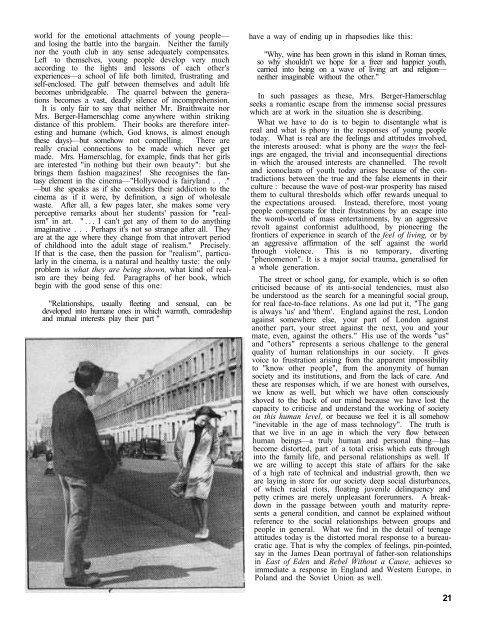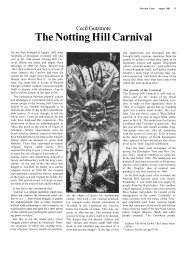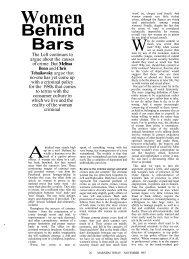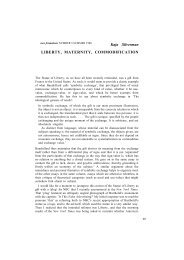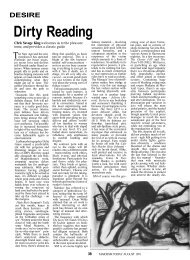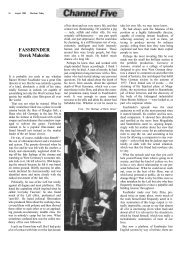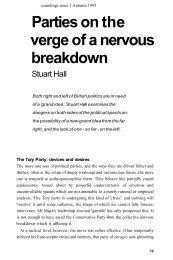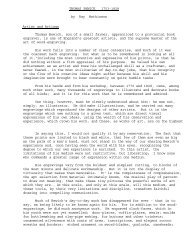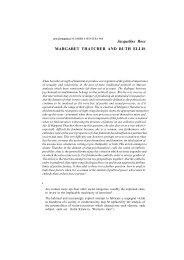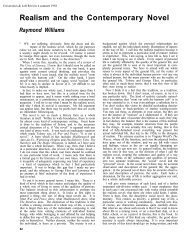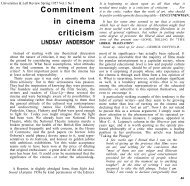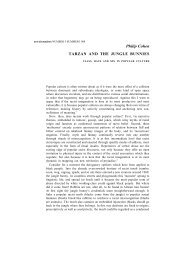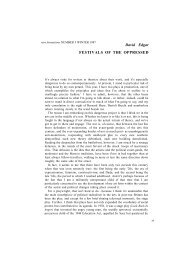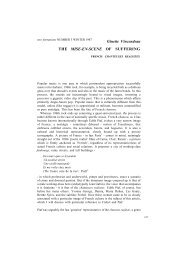Absolute Beginnings Stuart Hall
Absolute Beginnings Stuart Hall
Absolute Beginnings Stuart Hall
Create successful ePaper yourself
Turn your PDF publications into a flip-book with our unique Google optimized e-Paper software.
world for the emotional attachments of young people—<br />
and losing the battle into the bargain. Neither the family<br />
nor the youth club in any sense adequately compensates.<br />
Left to themselves, young people develop very much<br />
according to the lights and lessons of each other's<br />
experiences—a school of life both limited, frustrating and<br />
self-enclosed. The gulf between themselves and adult life<br />
becomes unbridgeable. The quarrel between the generations<br />
becomes a vast, deadly silence of incomprehension.<br />
It is only fair to say that neither Mr. Braithwaite nor<br />
Mrs. Berger-Hamerschlag come anywhere within striking<br />
distance of this problem. Their books are therefore interesting<br />
and humane (which, God knows, is almost enough<br />
these days)—but somehow not compelling. There are<br />
really crucial connections to be made which never get<br />
made. Mrs. Hamerschlag, for example, finds that her girls<br />
are interested "in nothing but their own beauty": but she<br />
brings them fashion magazines! She recognises the fantasy<br />
element in the cinema—"Hollywood is fairyland . . ."<br />
—but she speaks as if she considers their addiction to the<br />
cinema as if it were, by definition, a sign of wholesale<br />
waste. After all, a few pages later, she makes some very<br />
perceptive remarks about her students' passion for "realism"<br />
in art. "... I can't get any of them to do anything<br />
imaginative . . . Perhaps it's not so strange after all. They<br />
are at the age where they change from that introvert period<br />
of childhood into the adult stage of realism." Precisely.<br />
If that is the case, then the passion for "realism", particularly<br />
in the cinema, is a natural and healthy taste: the only<br />
problem is what they are being shown, what kind of realism<br />
are they being fed. Paragraphs of her book, which<br />
begin with the good sense of this one:<br />
"Relationships, usually fleeting and sensual, can be<br />
developed into humane ones in which warmth, comradeship<br />
and mutual interests play their part "<br />
have a way of ending up in rhapsodies like this:<br />
"Why, wine has been grown in this island in Roman times,<br />
so why shouldn't we hope for a freer and happier youth,<br />
carried into being on a wave of living art and religion—<br />
neither imaginable without the other."<br />
In such passages as these, Mrs. Berger-Hamerschlag<br />
seeks a romantic escape from the immense social pressures<br />
which are at work in the situation she is describing.<br />
What we have to do is to begin to disentangle what is<br />
real and what is phony in the responses of young people<br />
today. What is real are the feelings and attitudes involved,<br />
the interests aroused: what is phony are the ways the feelings<br />
are engaged, the trivial and inconsequential directions<br />
in which the aroused interests are channelled. The revolt<br />
and iconoclasm of youth today arises because of the contradictions<br />
between the true and the false elements in their<br />
culture : because the wave of post-war prosperity has raised<br />
them to cultural thresholds which offer rewards unequal to<br />
the expectations aroused. Instead, therefore, most young<br />
people compensate for their frustrations by an escape into<br />
the womb-world of mass entertainments, by an aggressive<br />
revolt against conformist adulthood, by pioneering the<br />
frontiers of experience in search of the feel of living, or by<br />
an aggressive affirmation of the self against the world<br />
through violence. This is no temporary, diverting<br />
"phenomenon". It is a major social trauma, generalised for<br />
a whole generation.<br />
The street or school gang, for example, which is so often<br />
criticised because of its anti-social tendencies, must also<br />
be understood as the search for a meaningful social group,<br />
for real face-to-face relations. As one lad put it, "The gang<br />
is always 'us' and 'them'. England against the rest, London<br />
against somewhere else, your part of London against<br />
another part, your street against the next, you and your<br />
mate, even, against the others." His use of the words "us"<br />
and "others" represents a serious challenge to the general<br />
quality of human relationships in our society. It gives<br />
voice to frustration arising from the apparent impossibility<br />
to "know other people", from the anonymity of human<br />
society and its institutions, and from the lack of care. And<br />
these are responses which, if we are honest with ourselves,<br />
we know as well, but which we have often consciously<br />
shoved to the back of our mind because we have lost the<br />
capacity to criticise and understand the working of society<br />
on this human level, or because we feel it is all somehow<br />
"inevitable in the age of mass technology". The truth is<br />
that we live in an age in which the very flow between<br />
human beings—a truly human and personal thing—has<br />
become distorted, part of a total crisis which eats through<br />
into the family life, and personal relationships as well. If<br />
we are willing to accept this state of affairs for the sake<br />
of a high rate of technical and industrial growth, then we<br />
are laying in store for our society deep social disturbances,<br />
of which racial riots, floating juvenile delinquency and<br />
petty crimes are merely unpleasant forerunners. A breakdown<br />
in the passage between youth and maturity represents<br />
a general condition, and cannot be explained without<br />
reference to the social relationships between groups and<br />
people in general. What we find in the detail of teenage<br />
attitudes today is the distorted moral response to a bureaucratic<br />
age. That is why the complex of feelings, pin-pointed,<br />
say in the James Dean portrayal of father-son relationships<br />
in East of Eden and Rebel Without a Cause, achieves so<br />
immediate a response in England and Western Europe, in<br />
Poland and the Soviet Union as well.<br />
21


